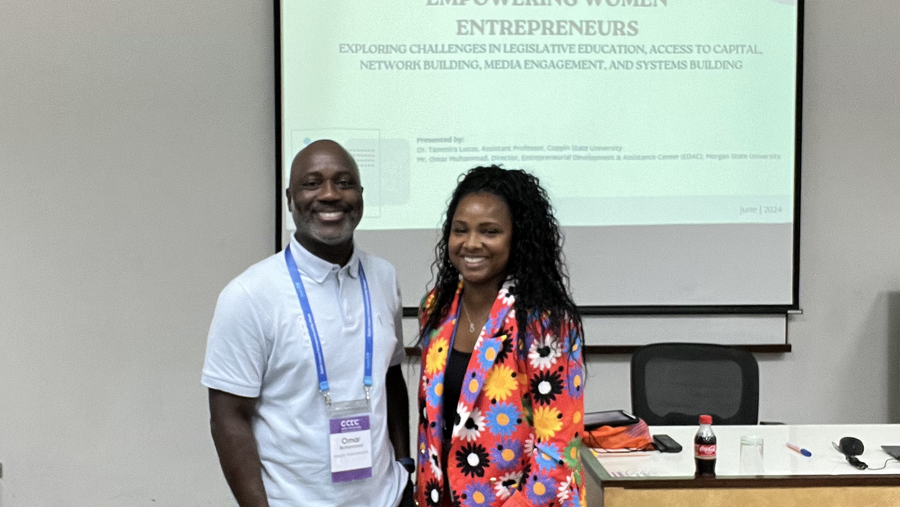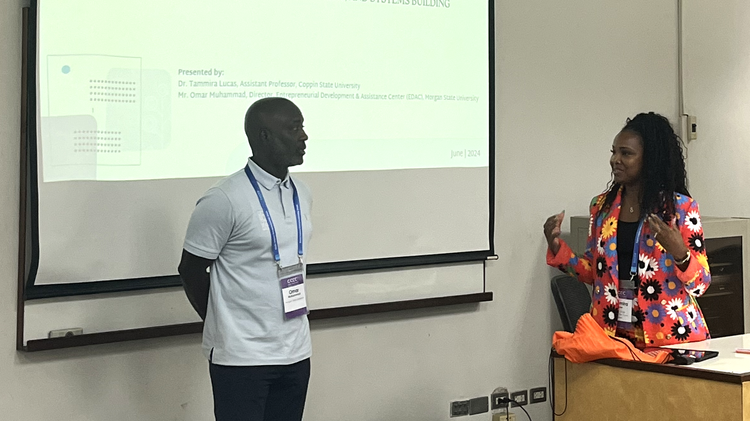
Black women entrepreneurs are a dynamic force driving economic growth, yet systemic challenges continue to impede their success. According to the World Economic Forum, in 2021, Black women startup founders received just 0.34% of the total venture capital spent in the U.S., and this figure has seen a further decline. In fact, in 2022, reports found Black and Latina women founders represented only 0.1% of venture capital funding, despite this demographic representing at least 42% of women-owned businesses.* These alarming statistics underscore the importance of investors like TEDCO in fostering an ecosystem that empowers women entrepreneurs.
Maryland experts and TEDCO colleagues Tammira Lucas, DBA, and Omar Muhammad highlight the multifaceted obstacles faced by these trailblazing business owners and propose a framework for progress in their recently published research paper, Empowering Women Entrepreneurs: Exploring Challenges in Legislative Education, Access to Capital, Network Building, Media Engagement, and Systems Building of Black Women Entrepreneurs.
Identifying barriers
When Muhammad took charge of Morgan State University’s Entrepreneurial Development & Assistance Center, he quickly noticed a trend. “We worked with women the most to help them get started in a business or even scale their business.” One of those aspiring entrepreneurs was Lucas. “We did a whiteboard session, she started her business and the rest is history.”

Since then, Lucas and Muhammad have collaborated on implementing programming and resources for female entrepreneurs. This includes training mom entrepreneurs with a custom curriculum and hosting a monthly event called Growth Beyond Me at Lucas’s coworking space, The Cube, which offers topical discussions and pitch competitions. “Not only are we educating them,” said Lucas, “but we’re also investing in them financially to help them grow.”
Muhammad noted a variety of hurdles. “Many of us, especially women – Black women – don’t have access to capital most times. They don’t know who their legislators are, or they don’t know the legislative process on how to engage legislators to impact laws that impact entrepreneurship, especially women entrepreneurship.”
Even more discouraging, Lucas noted “Black men get 1% of VC (venture capital) funds and Black and Latina women get 0.1%.”
What women report
Through their existing programming, Lucas and Muhammad surveyed 28 Black women entrepreneurs in the state of Maryland. The survey included 19 questions, some demographic and others open ended, framed to go beyond typical research questions and to understand the specific resources required to empower and assist Black women entrepreneurs.
From navigating complex legislative landscapes to securing much-needed capital, these women collectively shared a narrative about the roadblocks on their entrepreneurial journeys. Respondents indicated difficulties in understanding where to find or how to access resources, how to build business credit and navigate financial systems, a knowledge gap exacerbated by feelings of isolation without any sense of personalized support, networking or guidance. These challenges make business operations and scalability feel out of reach as entrepreneurs need marketing assistance and capital to grow their businesses while feeling unable to secure external funding due to a lack of established business models and reliable revenue streams.
“I didn’t find anything surprising,” Lucas said when asked about the information gathered, “I think it was just validation of the work that we had already been doing.”
Moving forward: The BEAM framework
Lucas noted the importance of looking to nontraditional solutions, asking “How do we create a cohesive framework that will address all of the problems that we’ve identified in this research?”
Their research proposes the BEAM (Black Entrepreneur Advancement Methodology) framework as a solution. This approach focuses on four key pillars:
- Pro bono accelerator programs: Providing free access to expert services to reduce startup costs and increase business survival rates. “There are so many different accelerator programs,” Lucas said, “but most entrepreneurs don’t even know what they actually need, which makes it more difficult to receive the support that will advance their businesses toward success.”
- Access to capital initiatives: Advocating for policies that ensure equitable access to capital for Black women entrepreneurs. Recent data highlights the stark disparities in venture capital funding. In 2022, all-women teams received just 1.9% of the $238.3 billion in venture capital funding, with women of color receiving only 0.39%. Additionally, Black-founded startups saw a 45% decrease in funding by the end of 2022. In 2023, Black-founded startups received less than 0.5% of the $140.4 billion in venture funding available in the U.S. market.
- Mentorship and networking programs: Connecting Black women entrepreneurs with experienced mentors and business leaders. “We have access to these resources,” Muhammad said, “so let’s figure out how to put women in positions where they have opportunities, a network and a supportive system.”
- Media visibility and advocacy campaigns: Increasing media coverage of Black women entrepreneurs to build brand awareness and attract investors. “Media can change the trajectory of your business. We’re establishing an opportunity,” Lucas said. This pillar aligns with recent studies showing that women of color received just 0.39% of available VC funding in 2022, highlighting the need for increased visibility and advocacy.
TEDCO's commitment to women entrepreneurs
TEDCO understands that Maryland’s economy thrives when we invest in women entrepreneurs. Our mission to enhance economic empowerment aligns with the goals of the BEAM framework, as we strive to create an inclusive and supportive ecosystem for businesses led by women. Through our programs that provide access to capital, mentorship and resources, TEDCO is dedicated to helping women entrepreneurs overcome challenges and drive positive change in their communities. Such programs include our Network Advisors program, the Institute for Women Entrepreneur Excellence, Inc. and the Social Impact Funds; these three opportunities offer dedicated services and funding to eligible entrepreneurial women.
As a venture growth advisor for TEDCO, Lucas is already doing the work. “My goal is to bring underserved founders into the TEDCO pipeline with the hope that they can actually receive some funding and the resources they need, which they sometimes don’t know they need, to become investment-ready,” she said.
Source: Baltimore Business Journal